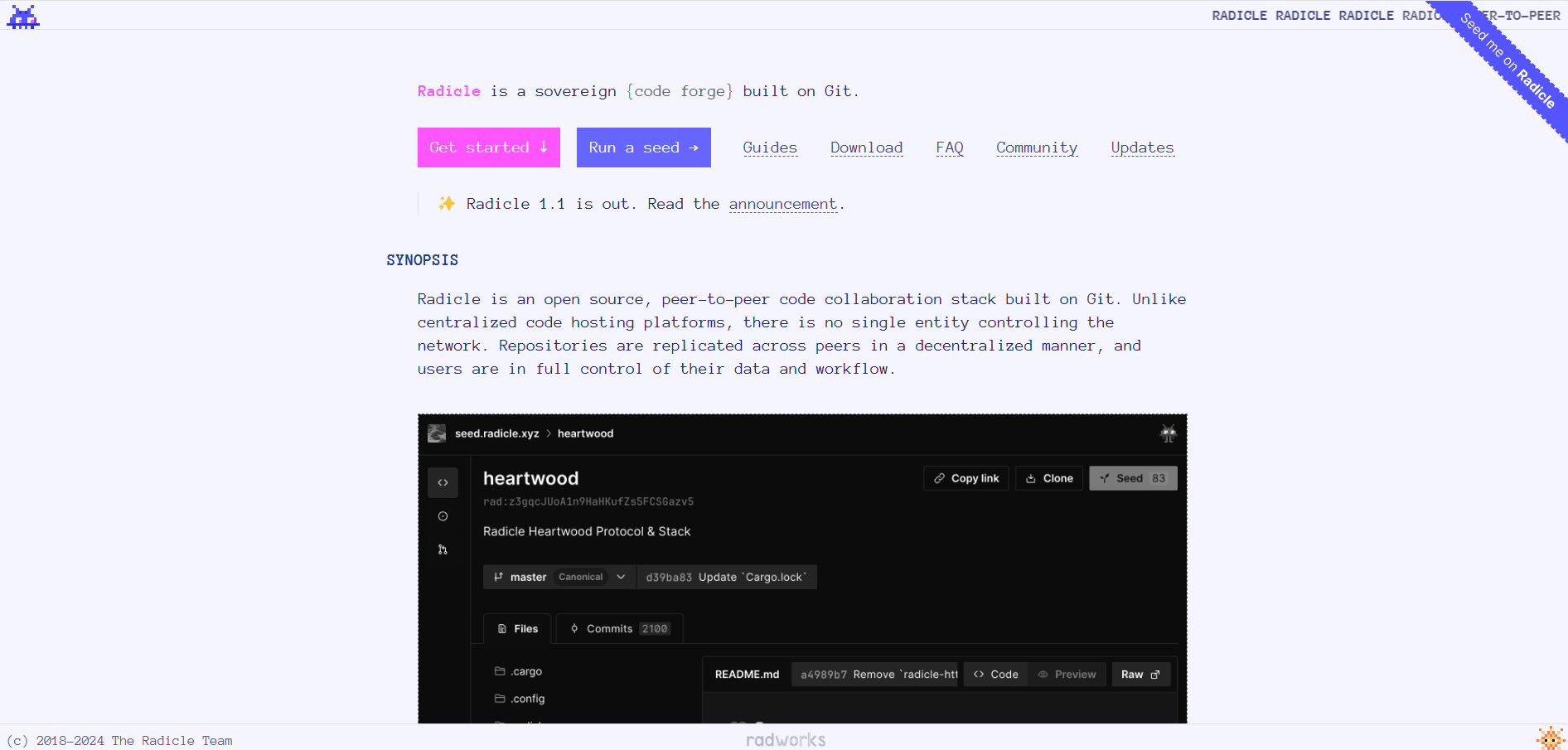Get insights.
Unlock value.
- 14-day free trial
- Set up in minutes
- No credit card required
Top 3 Web3 GitHub Alternatives
The code version control tool GitHub is owned by Microsoft.
A few years ago, Mircosoft banned the open-source code of a YouTube Downloader product from GitHub. That is, the YouTube downloader code Youtube-dl was removed by GitHub. Although, the ban was later raised. This is the problem one encounters with centralized systems like GitHub.
The control of centralized systems rests with the creator. With a centralized approach, the creator does not have a lot of control over the code. Decentralized Web3 systems impart privacy for your code.
Your project's decentralized approach also makes it censorship-resistant. This means that incidents like banning YouTube Downloader from GitHub cannot occur.
The following 3 Web3 GitHub alternatives are discussed in this blog.
- Radicle
- Gitopia
- GitChain
Site Name | Notable Features | Best For | Cons |
Radicle | Decentralized GitHub alternative; Crypto rewards (RAD token); Desktop app; Community governance | Developers seeking censorship-resistant, secure code hosting | Limited integration with existing dev tools; Steep learning curve |
Gitopia | Decentralized collaboration; Crypto rewards (LORE token); Blockchain + Git integration | Developers prioritizing autonomy and crypto-based rewards | New platform with user adoption challenges; Limited integration |
GitChain | Git + Blockchain integration; Uses Ethereum & IPFS; Immutable ledger entries; Distributed storage | Developers needing enhanced security and immutable version history | Scalability challenges; Possible legal issues due to decentralization |
Radicle
Radicle is an open-source & decentralized GitHub Alternative. It was launched in the year 2018. Radicle follows all the ethos of decentralized systems. They are highly secure & are censorship-resistant.
Contributions to the platform are rewarded in Crypto. Radicle exercises community-driven governance, i.e., it follows a democratic governance model. Radicle is controlled by its own proprietary Radicle token (RAD).
Radicle has a desktop application that runs on all three major operating systems: Windows, MacOS, and Linux.
Radicle was founded by Alexis Sellier & Eleftherios. The company is headquartered in Berlin, Germany.

Below are a few questions to ponder.
- What do you think about Radicle?
- Do you think it will gain traction among Web3 communities?
Below are a few pros and cons of Radicle.
Pros
- The application does not depend on central servers. This means higher security.
- Radicle is censorship-resistant. This means your code cannot be banned.
Cons
- Users face limitations while integrating with already existing development tools.
- This decentralized nature might present a steeper learning curves.
Gitopia
Gitopia is yet another decentralized platform for open-source code collaboration. It is receiving attention from Web3 communities, and it is quickly becoming a utopian world for open-source collaboration.
Gitopia follows the ethos of decentralized systems. This platform is completely resilient against censorship. This platform also promotes the free exchange of ideas and achieves a genuinely democratic governance model. The control is no longer with the founding entity.
Just like Radicle, Gitopia also rewards its contributors in cryptocurrency. Gitopia developed its own proprietary utility token named LORE. The contributors are rewarded with this LORE token. This reward system attracts new users.
Gitopia combines the best of both worlds: the version control system and BlockChain. It was founded in 2020 and is headquartered in Singapore. Parth Oberai and Faza Mahamood are its founders.
Below are a few keenly observed Pros and Cons of Gitopia.

Pros
- Gitopia benefits developers who prioritize autonomy.
- This system allows token holders to participate in significant governance decisions.
Cons
- Being a new player in the industry, Gitopia may face user adoption challenges.
- Just like Radicle, it lacks comprehensive integration with already existing development tools.
GitChain
As the product name clearly indicates, GitChain combines both Git & BlockChain. Git, which is a version control tool, was founded by Linus Torvalds. GitChain joins the best of both Git and BlockChain.
Yuri Rashkovskii, a Canadian developer, felt the need for a decentralized alternative to GitHub. This led to the launch of GitChain by Yuri. Thank Yuri. There is no more need for centralized servers so that the developers can coordinate what they do in a democratic governance fashion.
The Distributed Ledger & Distributed Storage are the basic infrastructure of GitChain. GitChain is built with Ethereum & IPFS (Inter Planetary File System). IPFS is a distributed storage system. It is impossible to store large amounts of data in BlockChain, for this increases the cost. Therefore, large amounts of data are stored in IPFS, and the metadata are stored in the distributed ledger.
GitChain has the same functionality as GitHub but with more resilience and security. This platform is really proving to be a promised player in the version control ecosystem.

Here are a few Pros & Cons.
Pros
- In GitChain, the immutable ledger entries ensure that every change is recorded.
- The platform brings enhanced security features for code storage & collaboration.
Cons
- It can undergo scalability challenges while trying to attain popularity, such as GitHub.
- This decentralized cryptosystem can be exposed to legal challenges.
Over To You
The 3 decentralized GitHub alternatives discussed here prove to be promising platforms. If you are a developer using GitHub, why not try these alternatives? These platforms may have a steep learning curve at the beginning, but once you are familiar with them, you can reap the benefits of decentralized Web3 systems.
You get the following with these decentralized systems.
- Censorship Resistance
- Crypto Monetization
- Increased Security
- Democratic Governance
I am leaving it to you for hands-on experience on these decentralized platforms. Share your experiences with these systems. If you need more alternatives to be included in this listicle, do let us know. You can reach us at [email protected]
Ready to explore privacy-first platforms? Start by trying BlockSurvey - secure forms and surveys built for Web3 communities.
Top 3 Web3 GitHub Alternatives FAQ
How do Web3 alternatives differ from GitHub?
These Web3 alternatives may offer different features, pricing structures, and levels of customization compared to GitHub.
Are these alternatives compatible with Web3 technology?
Yes, these alternatives can be used for Web3 development and are compatible with decentralized applications and blockchain technology.
Can I use these alternatives for version control in my Web3 projects?
Yes, these alternatives provide version control capabilities similar to GitHub for managing changes and collaborating on Web3 projects.
Why should I consider using a Web3 GitHub alternative?
Using a Web3 GitHub alternative can provide additional security, privacy, and decentralization for your projects.
Can I still collaborate with others on projects using a Web3 GitHub alternative?
Yes, most Web3 GitHub alternatives still allow for collaboration with others through features like pull requests and issue tracking.
Are there any specific features that make Web3 GitHub alternatives better for blockchain development?
Some Web3 GitHub alternatives offer features like smart contract auditing, tokenized rewards for contributions, and integration with blockchain networks for seamless development.
Get insights.
Unlock value.
- 14-day free trial
- Set up in minutes
- No credit card required
